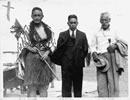Origins in New Zealand
Rugby league began in New Zealand in the 1900s. Following the 1905–6 rugby union tour of Britain by the New Zealand team, a number of players suffered financial difficulty while the New Zealand Rugby Football Union (NZRFU) made a significant profit. This was partly the motivation behind the organisation of an overseas rugby league tour in 1907–8, which included eight former All Blacks. The players were to share in any profits from the tour and accordingly the team was dubbed the 'All Golds'.
Māori team in Australia
In 1908 former All Black Albert Asher organised an ‘All Māori’ team to play rugby league in Australia. Before leaving he informed the press that the team was travelling to play rugby union, to avoid any opposition. The side left an impression on Australian audiences with their attractive style of football. When the team returned, Asher arranged matches in New Zealand’s main centres, and some Māori players switched codes to play the 13-man game. The following year Asher organised another tour to Australia, in which the Māori team defeated Australia 16–14 in the test. This was the first league side to wear the kiwi emblem that became the symbol of the national team.
Māori Rugby League Board
Māori rugby league received an added boost with the establishment of the New Zealand Māori Rugby League Board in 1934. The board’s first patron was the Kīngitanga (Māori King movement) leader King Korokī, and the role has remained with the Kīngitanga ever since.
Three years later the New Zealand Māori team enjoyed arguably their greatest victory ever, 16–5 over the Kangaroos (Australia’s national team) at Carlaw Park, Auckland. Rugby convert George Nēpia was at fullback; Jack Hemi and Steve Watene, who were accustomed to playing there, moved to other positions to accommodate the sporting great.
Māori versus French
The national Māori rugby league team faced the French in 1955, winning 28–20. In 1960 they played the French and lost 23–12. The 1960s ushered in a new, long-serving coach, Tommy Newton.


